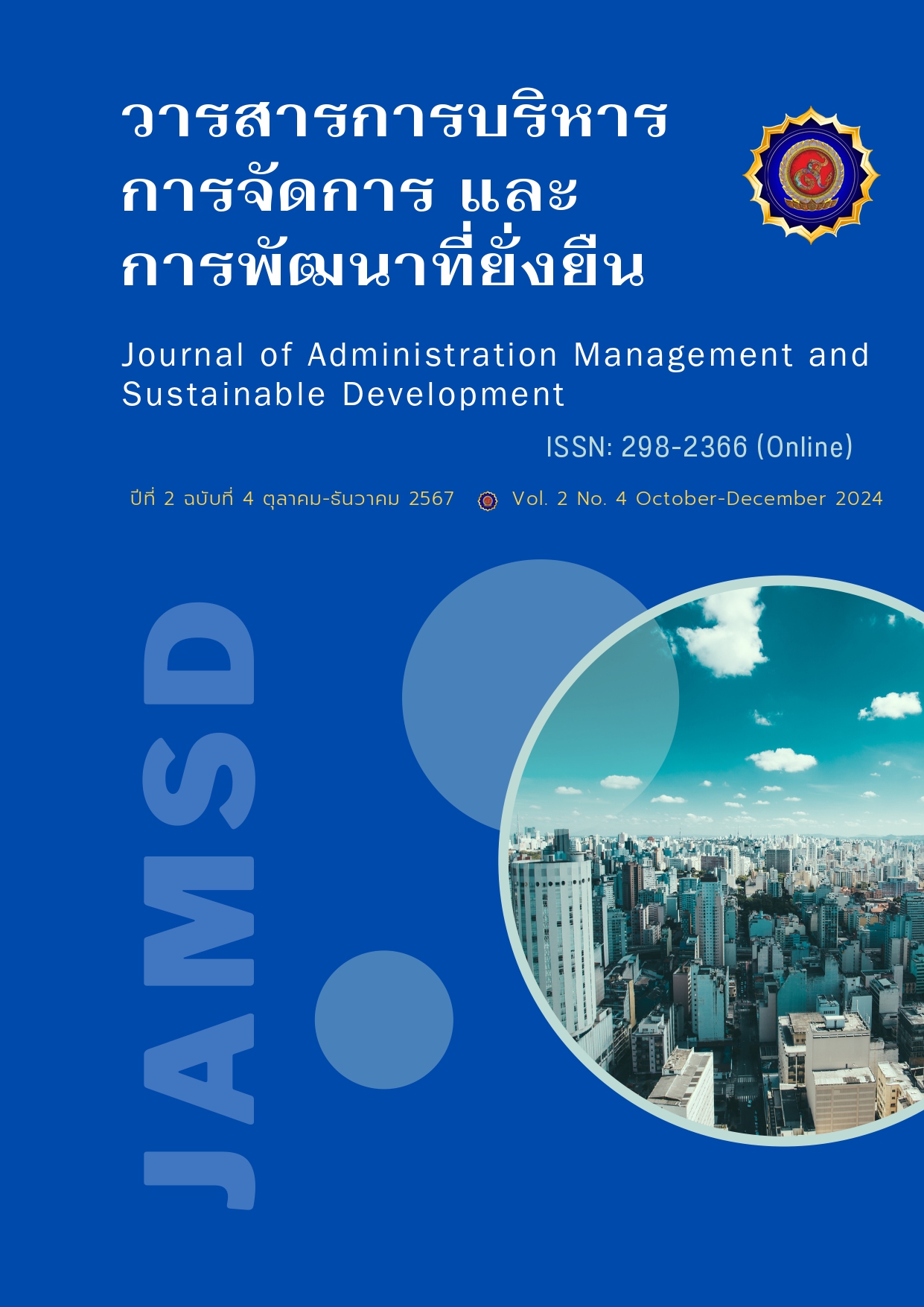Participatory Management: Approaches to Building Collaborative Empowerment in Organizations
Keywords:
administration, management, cooperation baseAbstract
Participative management is a management approach that allows all stakeholders to participate in decision-making, planning, and sharing responsibility for the outcomes. The primary goal is to create cooperation and unity within the organization, leading to effectiveness, efficiency, and sustainability in operations. Participative management is an effective method that helps achieve objectives, fosters collaboration, and enhances satisfaction for all parties involved. However, it requires appropriate processes to address constraints effectively and benefits both individuals and organizations. When managers use motivation to provide opportunities for employees or relevant stakeholders to engage in thinking, decision-making, execution, and shared responsibility, it helps develop high-quality work. This approach opens up opportunities for individuals or groups to be involved in operations, whether directly or indirectly, in the form of awareness, collaborative thinking, joint actions, decision-making, and evaluation. This involvement fosters a sense of duty and shared responsibility among all parties, ultimately leading to the organization's goals and facilitating the application of participative management principles.
References
จรัส สุวรรณมณี. (2564). ความหมายของการบริหารจัดการแบบมีส่วนร่วม. สุพรรณบุรี: มหาวิทยาลัยราชภัฏสุพรรณบุรี.
ธงชัย สันติวงษ์. (2553). หลักการจัดการ. กรุงเทพฯ: ไทยวัฒนาพานิช จำกัด.
นงลักษณ์ ศรีสุวรรณ. (2563). หลักการและแนวทางการบริหารแบบมีส่วนร่วม. นครศรีธรรมราช: มหาวิทยาลัยราชภัฏ นครศรีธรรมราช.
ปรียาพร วงศ์อนุตรโรจน์. (2554). การบริหารจัดการแบบมีส่วนร่วม. กรุงเทพฯ: ศูนย์สื่อเสริมกรุงเทพมหานคร.
วรัญญู บุญช่วย. (2558). การมีส่วนร่วมของประชาชนในกระบวนการตัดสินใจขององค์กรปกครองส่วนท้องถิ่น. วารสารวิจัย มหาวิทยาลัยขอนแก่น, 13(2), 141-154.
ศิริพร แก้วมณี. (2563). การมีส่วนร่วมของประชาชนในกระบวนการจัดทำแผนพัฒนาเศรษฐกิจและสังคมแห่งชาติ ฉบับที่ 13 (พ.ศ. 2566 - 2570). วารสารบริหารธุรกิจ มหาวิทยาลัยธรรมศาสตร์, 43(3), 45-60.
สมชาย พูลสวัสดิ์. (2559). การบริหารแบบมีส่วนร่วม กลยุทธ์สู่การพัฒนาที่ยั่งยืน. วารสารมหาวิทยาลัยราชภัฏสกลนคร, 13(2), 1-14.
สมชาย วงษ์ใหญ่. (2555). การบริหารจัดการแบบมีส่วนร่วมในองค์กร. กรุงเทพฯ: สำนักพิมพ์ไทยพัฒนาการ.
พิชญ์ ภูวชยานนท์. (2560). การมีส่วนร่วมของพนักงานในองค์กรสมัยใหม่. กรุงเทพฯ: สำนักพิมพ์จุฬาลงกรณ์มหาวิทยาลัย.
อนุสรณ์ ธรรมใจ. (2560). การบริหารจัดการแบบมีส่วนร่วมในองค์กรสมัยใหม่. กรุงเทพฯ: สำนักพิมพ์ มหาวิทยาลัยธรรมศาสตร์.
Brown, A. (2021). The role of participatory management in community development in Thailand (Master’s thesis). Faculty of Social Sciences, Chiang Mai University, Chiang Mai, Thailand.
Bennett, R., & O’Brien, D. (2014). Participation: A guide to good practice. Community Development Journal, 49(2), 203-222.
Edmondson, A. (1999). Psychological safety and learning behavior in work teams. Administrative Science Quarterly, 44(2), 350-383.
Cohen, J. M., & Uphoff, N. T. (1980). Participation’s place in rural development: Seeking clarity through specificity. World Development, 8, 213-235.
Dirks, K. T., & Ferrin, D. L. (2002). Trust in leadership: Meta-analytic findings and implications for research and practice. Journal of Applied Psychology, 87(4), 611-628.
Greenberg, J., & Baron, R. A. (2003). Behavior in organizations: Understanding and managing the human side of work. Prentice Hall.
Gonzalez, C. (2014). The role of technology in participative management: A case study. Journal of Business Communication, 51(4), 384-401.
Jones, M. (2022). A study of participatory management in public organizations in Thailand (Master’s thesis). Faculty of Political Science, Chulalongkorn University, Bangkok, Thailand.
Katzenbach, J. R., & Smith, D. K. (2005). The wisdom of teams: Creating the high-performing organization. Harper Collins.
Kirkman, B. L., & Rosen, B. (1999). Beyond self-management: Antecedents and consequences of team empowerment. Academy of Management Journal, 42(1), 58-74.
Katzenbach, J. R., & Smith, D. K. (1993). The wisdom of teams: Creating the high-performance organization. Harper Business.
Locke, E. A., & Latham, G. P. (2002). Building a practically useful theory of goal setting and task motivation: A 35-year odyssey. American Psychologist, 57(9), 705-717.
Likert, R. (1961). New patterns of management. McGraw-Hill.
Robinson, S. P. (2015). Organizational behavior. Pearson.
Senge, P. M. (1990). The fifth discipline: The art and practice of the learning organization. Doubleday.
Tjosvold, D. (2008). The cooperative and competitive dilemma in managing groups. International Journal of Conflict Management, 19(3), 290-307.
Vroom, V. H., & Yetton, P. W. (1973). Leadership and decision-making. University of Pittsburgh Press.
McGregor, D. (1960). The human side of enterprise. McGraw-Hill.
Mayo, E. (1945). The social problems of an industrial civilization. Routledge.
Smith, J. (2023). The impact of participatory management on employee performance in manufacturing companies in Thailand (Doctoral dissertation). Faculty of Business Administration, University of the Thai Chamber of Commerce, Bangkok, Thailand






